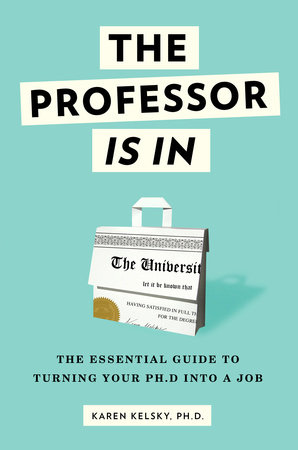Sure you have a PhD in this and that, but how does that help you in getting a job? Better yet, the primary question that needs to be asked and answered is: “How do you plan to translate that fancy degree to a real job that can actually pay the bills and make you feel fulfilled?”
Dr. Karen Kelsky addresses this issue in depth in her book The Professor Is In, a straightforward guidebook for all those aspiring academicians who are looking at getting a tenure-track appointment in one of the Ivy League institutions or a small liberal arts college.
In this book, Kelsky did not mince words in advising professionals to get teaching experience, do research/write papers, apply for grants, and attend conferences. Simply put: focus on building yourself so you can “sell” yourself later. She made it clear from the very start that: “Graduate school is not your job; graduate school is a means to the job you want.”
She went on further by saying: “Do not settle in to your graduate department like a little hamster burrowing in the wood shavings. Stay alert with your eye always poised for the next opportunity, whatever it is; to present a paper, attend a conference, meet a scholar in your field, forge a connection, gain a professional skill.”
She hit the mark when she touched a crucial and sensitive topic on the role that advisers play in the career of a PhD student; that empty promises of “you will surely get placed in a position after you graduate because our college/university records show that most of our graduates get tenured positions the moment they step out of the four walls of the school” is not an assurance that one will land a job after that dissertation is defended and (hopefully) published.
Kelsky is straightforward and blunt – but not abrasive and scathing – in telling the reader(s) to understand and accept reality, and its complicated maze of long decision-making process, exhausted professors, and dwindling university budget.
In The Professor Is In, Kelsky dishes out details that many PhD candidates don’t hear from their advisers or don’t have the courage to ask their advisers. She gives techniques on how to conduct one’s self in academic interviews, how to navigate the job market minefield, negotiating contracts and terms, among other beyond-the-dissertation-level-of-questions which most PhD candidates mistakenly stuck themselves into.
The book starts with solid account of the state of America’s academic system – and how adjunct positions take the place of most tenured appointments because of decreasing state funding for higher education, among other reasons, while tuition increases at public colleges and universities.
Kelsky makes it clear that the academic world is a political arena in as much as it is a social and intellectual playground; hence anyone who is bent on getting an academic career should package himself/herself well to prospective employers with the curriculum vitae playing a significant and active role in snagging that positive first impression.
She describes the CV as “not a passive document that you mostly ignore, and update only grudgingly.” She continues: “Your CV is your mini-me; put another way, it is your standard-bearer on the job market front. It an extension of yourself, and it needs ongoing active attention.”
As a person who is now doing her graduate studies and thinking about getting her doctorate degree in the future, this book hits the very core of my academic plan. In more than 400 pages, she summarized the world that nobody dares to discuss with in-depth details.
It goes without saying that anyone with a plan to traverse the academic path should stop talking about how relevant his/her dissertation is and buy a copy of this book and spend some time with it in a coffee shop, in a library, or the comforts of one’s bedroom. Then, think, ponder, reflect.
A word of caution though: this is not a book for everyone.
My husband doesn’t believe in the weight of a Master’s degree or the power of a doctorate to advance one’s career. After all, he said, he has traveled the world, served in four Olympic events (and working on a fifth), and succeeded in most of his business dealings with a BA Journalism degree from Brigham Young University.
I’m quite the opposite.
I’m a lover of school. I romanticize textbooks and take pleasure in getting new set of school supplies especially during the start of a semester. I’m a believer of the importance of writing academic papers to broaden knowledge, widen research and development, and enhance inherent and acquired skills. It’s painstaking but very helpful in cultivating an attitude of excellence, integrity, and honesty.
So while I am not bent on pursuing an academic career, this book was helpful in making me understand the sun in which most of these professor-planets revolve around. I now understand why my program adviser looked stressed after a university-wide meeting or why a part-time professor (or adjunct professor) would say that he is teaching NOT for the money.
It will take you some time to digest the content of this book if you’re not open to the idea of being slapped in the face with the reality hounding the academic arena.
So… pace yourself, read a chapter or two in a day, and think about what Kelsky said in all the chapters.
I tell you, she makes a lot of sense even if it might be a bitter pill to swallow.
***
Disclosure of Material Connection: I received this book free from Blogging for Books. I was not required to write a positive review. The opinions I have expressed are my own. I am disclosing this in accordance with the Federal Trade Commission’s 16 CFR, Part 255: “Guides Concerning the Use of Endorsements and Testimonials in Advertising.”




